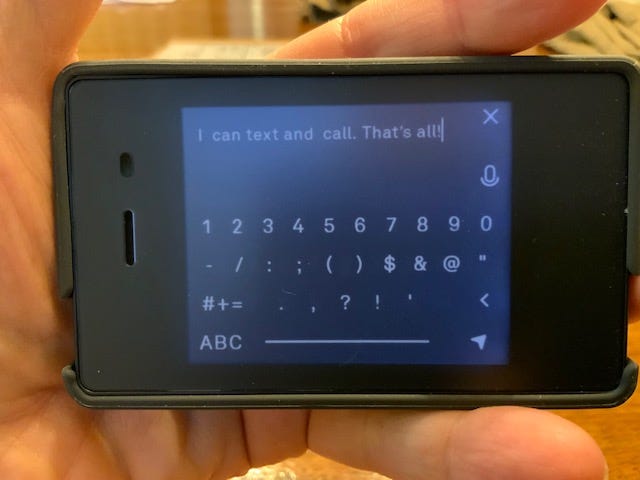A small boarding school in New England is about to take a big leap — a leap many of us parents wish we could take with our children.
This coming September, The Buxton School, in Williamstown, Massachusetts, is becoming a smartphone-free campus.
No smartphones at all — not for students; not for teachers; not for administrators.
The school’s leaders laid out the case for this bold decision in a letter to parents, students, and supporters.
Buxton is meant to be a place that fosters conversation, that encourages bridge-building, that helps students see and understand all that they are capable of. But smartphones and the social-media apps they so brilliantly and relentlessly beam into our students’ lives are imperiling what Buxton does and who we are.
Buxton, like many other schools, had already worked hard to minimize the use of smartphones on campus. However, it wanted a game-changer.
We have multiple customs about when and where phones can be used, and we have spent untold hours talking with kids about what else they could be doing with their time instead of scrolling, forwarding, group-texting, posting. But the technology is too compelling and is so embedded in our students’ lives that we felt we had to make and take a stand. . . .
[T]here is a mental-health crisis among young people, and we have seen from intense lived experience that smartphones in particular are damaging our students. . . . What we are trying to interrupt is the compelling immediacy of the ‘respond now’ culture that smartphones not just enable but essentially demand.
Buxton students will still have WiFi, laptops, and tablets — all the technology necessary for schoolwork and staying in touch with their families and social networks.
And everyone on campus will have a “dumb phone” -- for calling and texting.
But without a smartphone in the hand or pocket, students will be empowered to pause, to reflect, to create the space to gain perspective on their day.
What and Where is Buxton?
Buxton is a 115 acre haven in the Berskshire Mountains, down the road from Williams College, adjacent to the Clark Art Institute.
As soon as I saw the announcement that Buxton was going smartphone-free, I reached out to two of the school’s leaders.
Franny Shuker-Haines is the Director Emeritus of Buxton — a 25-year-veteran of the school, who has taught English, and theater, and directed plays, and been a college advisor to hundreds of students over the years — including my oldest child, who is a Buxton graduate.
Shuker-Haines and her colleagues believe that smartphones threaten at least two of Buxton’s pillars: Kindness and Critical Thinking.
We are a community that's meant to help students see the nuance in things, to complicate issues, so that they're no longer so black and white, but become the shades of gray that all issues truly are. . . . What social media asks of people is to judge instantly and harshly, to respond right now . . . and to respond in terms that are inflammatory enough that it will cause other people to respond. So it was making it harder for us to lean into nuance.”
Please watch the following short excerpt of our Wavemaker Conversation, where Shuker-Haines gives us a taste of what she has witnessed on the front lines of education as smartphones became appendages.
Peter Beck: On The Opportunity Cost of Smart Phones
I also reached out to Buxton’s new Head of School, Peter Beck, a graduate of Yale College and Yale Law School, who has taught English, history, and other subjects at Buxton.
In the following six-minute video excerpt, Beck delivers a memorable, impassioned, eye-opening account of the opportunity costs of smart phones — and the opportunities Buxton hopes to reclaim by eliminating them.
The Urgency
One last note on the sense of urgency to make this move now.
As Shuker-Haines tells me in our conversation, which you can listen to in its entirety on the Spotify player below:
We're dealing with a generation that has truly been through a trauma. I do think the pandemic is a trauma. . . . I would argue that adolescents in particular have suffered more than younger kids or older kids, because this is the stage of your life where you're really learning how to be in the world with other people without necessarily being your parents' child or under somebody else's sort of extreme protection.
Perhaps the Buxton leap to smartphone-free living can ease this trauma and further empower young people.
Perhaps the Buxton leap will succeed in interrupting “the compelling immediacy of the ‘respond now’ culture.”
Perhaps Buxton, by taking this leap, will chart a course for the rest of us.
See What You’ve Missed
I hope you will subscribe now to The Wavemaker Conversations Newsletter by taking a moment to enter your email address.
If you’d rather sample more before you subscribe, please check out my recent conversation with neurosurgeon and CNN Chief Medical Correspondent Dr. Sanjay Gupta, here.
Or, you can watch my conversation here with Smith College Professor Loretta Ross, author of the upcoming book, Calling In The Calling Out Culture.
Coming Soon on The Wavemaker Conversations Newsletter
In June, I’ll be in conversation with Azar Nafisi, live at the annual Nantucket Book Festival.
Nafisi’s courageous story of teaching forbidden western classics to a small group of female students in post-revolutionary Iran is documented in her international bestseller, Reading Lolita in Tehran. We’ll be speaking about her life and her body of work, including her latest book — Reading Dangerously.
Also coming in June is my conversation with a particularly imaginative force in the field of climate change, Spencer Glendon, who spent much of his career in finance as a partner in the Boston firm, Wellington Management.
Glendon is working to transform our ability to anticipate, visualize and, hopefully, slow down the escalating impacts of climate change — with his team at Probable Futures.





